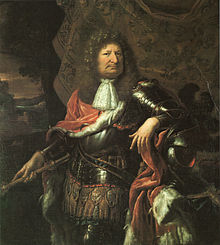Frederick William, Elector of Brandenburg
This ended with the treaties of Labiau, Wehlau, Bromberg and Oliva; these changed the status of Ducal Prussia from that of a Polish fief to fully sovereign (after a brief period of control by Sweden).Although he rejoined the anti-French alliance in 1674, this left him diplomatically isolated; despite conquering much of Swedish Pomerania during the Scanian War, he was obliged to return most of it to Sweden in the 1679 Treaty of Saint-Germain-en-Laye.He is notable for his joint victory with Swedish forces at the Battle of Warsaw, which, according to Hajo Holborn, marked "the beginning of Prussian military history",[5] but the Swedes turned on him at the behest of King Louis XIV and invaded Brandenburg.After marching 250 kilometres in 15 days back to Brandenburg, he caught the Swedes by surprise and managed to defeat them on the field at the Battle of Fehrbellin, destroying the myth of Swedish military invincibility.[6] Since his capital Berlin had suffered greatly from the Swedish occupation during the Thirty Years' War, Friedrich Wilhelm commissioned the master engineer Johann Gregor Memhardt to plan a city fortification.His great grandson, Frederic II, later said of him with regard to the battle: ”He was praised by his enemies, blessed by his people; and posterity dates from that famous day the subsequent elevation of the house of Brandeburg”.[9] In 1682, at the suggestion of the Dutch merchant and privateer Benjamin Raule, he granted a charter to the Brandenburg Africa Company (BAC), marking the first organised and sustained attempt by a German state to take part in the Atlantic slave trade.As Brandenburg-Prussia remained economically impoverished after the Thirty Years War, he hoped to replicate the mercantile successes of the Dutch East India Company.Luise Henriette also distinguished herself through charity, Sophie Dorothea through extraordinary business acumen, which allowed her to increase both her own fortune (and thus the inheritance of her children) and to strengthen the state economy.



Frederick WilliamFrans LuycxElector of BrandenburgDuke of PrussiaGeorge WilliamFrederick IIIStadtschlossBerlinBrandenburg-PrussiaHoly Roman EmpirePotsdamBerlin CathedralCountess Luise Henriette of NassauPrincess Dorothea Sophie of Schleswig-Holstein-Sonderburg-GlücksburgCharles, Electoral Prince of BrandenburgFrederick I, King in PrussiaPhilip William, Margrave of Brandenburg-SchwedtMarie Amelie, Hereditary Princess of Mecklenburg-GüstrowMargrave Albert FrederickMargrave CharlesElisabeth Sophie, Duchess of Saxe-MeiningenMargrave Christian LudwigHohenzollernGeorge William, Elector of BrandenburgElisabeth Charlotte of the PalatinateCalvinistGermanElectorBrandenburgPrussiaHouse of Hohenzollernpost-Westphaliankingdomson and successorMathias CzwiczekMargraviate of BrandenburgDuchy of ClevesCounty of MarkDuchy of PrussiaThirty Years' WarNetherlandsLeiden UniversityFrederick Henry, Prince of OrangeChristinareligious tolerancesubsidiesSecond Northern WarLabiauWehlauBrombergDucal PrussiaFranco-Dutch WarDutch RepublicWilliam of OrangeTreaty of VossemSwedish PomeraniaScanian War1679 Treaty of Saint-Germain-en-LayeClevesJülichRavensbergStatue of Frederick WilliamCharlottenburg PalacePrussian ArmyBattle of WarsawHajo HolbornLouis XIVinvaded BrandenburgBattle of FehrbellinGreat Sleigh DriveAuftragstaktikJohann Gregor MemhardtBerlin Fortressbastion fortsGeneral War CommissariatJoachim Friedrich von Blumenthalmercantilisminternal improvementsEdict of NantesWalloonHuguenotsEdict of PotsdamEstates-GeneralPrussianGeorg SteenkeFrederic IIPeter the GreatCharles XI of SwedenHuguenotBrandenburg Africa CompanyAtlantic slave tradeDutch East India CompanyWest AfricaBrandenburger Gold CoastAmericasImperial Navyone built in 1875the other built in 1913Norddeutscher Lloydwith the same nameJohannes MytensGedeon RomandonThe HagueJülich-BergLuise Henriette of NassauFrederick Henry of Orange-NassauAmalia of Solms-BraunfelsWilliam the SilentFrederick I of PrussiaLudwika Karolina RadziwiłłGröningenSophie DorotheaHolstein-Sonderburg-GlücksburgPhilip, Duke of Schleswig-Holstein-Sonderburg-GlücksburgSaxe-LauenburgChristian Louis, Duke of Brunswick-LüneburgPhilip WilliamMarie AmelieAlbert FrederickCharles PhilipElisabeth SofieChristian LudwigKarl Ludwig von PöllnitzJoachim Frederick, Elector of BrandenburgJohn Sigismund, Elector of BrandenburgCatherine of Brandenburg-Küstrin